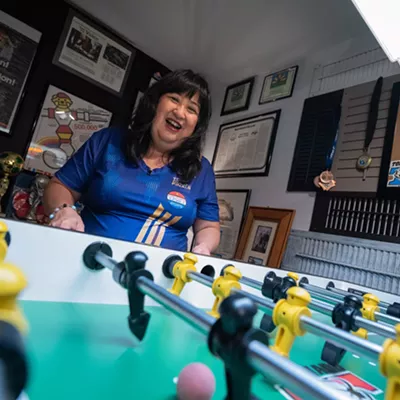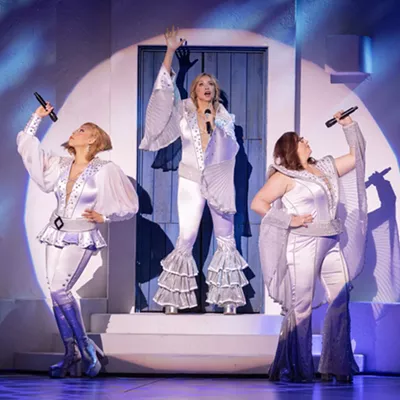
Is Eugene Miles a thousand-year-old petty thief from Spain? Oscar Wilde’s cat? Or just a crazy old man? Washington state author Jonathan Evison’s newest novel Again and Again introduces us to Desert Green retirement home’s most cantankerous resident. Though “Geno” wants to spend his last days alone, he’s won over by his charming cleaning man, Angel, and starts to tell him the story of his life, or lives. Evison takes the reader across centuries, chasing long-lost love through various chapters of history while learning how to value the present.
On Tuesday, Nov. 14, Jonathan Evison will speak about his book with author and Spokesman-Review columnist Ammi Midstokke for Northwest Passages’ next event, this time in the Myrtle Woldson Performing Arts Center at Gonzaga University. The Inlander caught up with Evison before his stop in Spokane, talking about everything from story craft to existential loneliness, cats and reincarnation—while avoiding as many spoilers as we could.
INLANDER: A big theme in Again and Again is loneliness. Have you dealt with loneliness yourself?
EVISON: That's the heart of the book. Isolation: That's the heart of the human condition, that's the fundamental question — this question of isolation and the stories we tell to heal and the stories we tell to connect. On some level [I’ve dealt with it,] existentially, I mean. I have three young kids, a career, and two households. And the truth is I hardly have time to take a shower most of the time. But, ultimately, any time I stand out on a bluff in the moonlight, or just looking up at the sky, you get a sense of isolation. I've been very blessed in my life. I'm blessed with friends and family. So not loneliness in the sense that Eugene knows it, but isolation, sure. We're born alone, we die alone. We're always, as human beings, looking for that connection to save us all. We really have to buffer ourselves from nothingness and meaninglessness. That's the human condition. We're pack animals, we depend upon one another. We're dependent on our history. We're dependent on our past. It's an evergreen theme for me. This idea of connection is probably in all of my books.
Did you base Angel, the caregiver in the book, on anyone in particular?
Just sort of an ideal caregiver, you know? I was a respite care provider myself for five or six years, you know. So parts of Angel are me [and] how I would deal with my clients. I'm a natural caregiver, always taking in stray dogs. I got all these kids. It comes naturally to me to care for things. So part of it is just how I dealt with the rapport I had with my clients. There's all these guidelines, but when you're wiping somebody's butt, you're very intimately involved with this person [and] every part of their moods. It’s a similar dynamic with Angel and Eugene.
You created this really interesting relationship between reader and narrator. How did you come up with this untraditional relationship?
Honestly, that was the original conceit of the whole book, to write a book that involved the reader more actively than I have ever involved the reader. With each book, I’m just more aware of that partnership with the reader. I mean, talk about connection. That's why we tell stories — to connect on the other end. I think it's kind of natural for writers, when they're learning, to attach themselves to this authorial voice where they're talking to the reader and it's about their story and their ideology and they're trying to edify the reader in some way. And the better I get at writing, the more novels I write, the more I realize that it's really, truly all about that act of connection. It’s all about this dance between the writer and the reader where the reader has got to do everything the writer is doing [but ] backwards and in heels. So when you fully embrace that relationship, the reader becomes the greatest tool in your belt because once you've earned the reader's trust, which is particularly important in a narrative like Again and Again, that allows me to undermine the reader's expectations, which is so fun. But that surprise has to be set up just right. It has to feel inevitable.
It's kind of a puzzle. That’s why I came up with the puzzle pieces on the cover. Geno does puzzles, too, and I'm like, "We gotta have puzzle pieces." I conceived of this novel as a puzzle. The puzzle of Eugene, of his life, and trying to put [it] together. We have divergent stories, sometimes diametrically opposed stories that he tells us and the reader is left to piece together what we get to know as Geno's real history. It's up to the reader to discern what is.
That's what I love about a narrative. When I read a book, I want it to be my narrative. I want the writer to just get out of the way. I want to own the narrative. I wanna feel like that experience is mine to live. The more the writer gives themselves to me as a reader and trusts me, those are the books I like the best—the books that feel like when I'm done with them, I'm carrying them around. Like I lived that experience, it feels like it's something out of my own life. That's what happens when you actively involve the reader. I think what is probably resonating with readers most of all are these themes of enduring love—I mean, the book is several love stories really—but I think what's engaging them is the craft of it.
I always thought that intimacy and trust and belief were all inextricably entwined. But your novel challenged me to think that belief might not always be necessary—because it feels like there is love and intimacy and trust even when you don't know what to believe.
I think that gets to the heart of what makes an unreliable narrator successful. It’s consistency—they're consistent in their logic. Eugene's logic is not traditional logic, but Eugene has his own logic. The reader pieces that together. Once you learn the real version of a story you'd already heard in a different guise, you then understand why Eugene told it that way the first time. So there's a logic and a consistency to it. I don't even think you have to necessarily like Eugene. We like people for their strengths, but we love them for their weaknesses. That's something I think about a lot. For me, my characters are always deeply flawed, because those are the most interesting characters and ultimately the most relatable characters. We all know we're deeply flawed. We all are constantly, if we have a conscience, holding ourselves accountable. This interior life, this interior mental life, that's what really drives the story. It's not helicopter chases, it's not events, even. It's the interiority of the character and the growth of the character and the decisions the character makes and how they complicate the character's journey and their goal to get to sort of their idealized self.
There are a lot of different historical periods that you move through in Again and Again. How did you do your research to get those periods accurate?
I found a lot of the same information about Moor Spain over and over. [But] I didn't do a super deep dive because it's not historical in the sense that I'm not talking about regimes. What was really important for me was to get that lived-in feel of the streets of Seville in the late 10th century. What would it feel like in the marketplace? What did the architecture look like? That's hard information to get because obviously there's no photographs. You can sometimes find artistic renderings. Sometimes there's ruins in the modern city. It was not one of the easier things I've researched. You learn there are little things that you have to be careful, you can't hit any false notes. That’s sort of my defense when people say, "You're just a fat, middle aged white guy—how come you are always writing characters of color or gay characters or non-binary characters or women?" It's an exercise in empathy. I’m trying to write outside of my experience. That's the whole point. Yes, I use the jobs I've had, like caregiver or landscaper, but I'm really trying to walk a mile in somebody else's shoes. I'm gonna make sure I get it right.
I always have people whose life experience more closely mirrors my characters than my own vet it. But the onus is on me to get it right. Because as a reader, it just takes one false note and I'm out. It just sort of shatters my trust in the writer. So that's the thing about research. It's not so much about doing broad research. I just find exactly what I need to know. I refer to people who know a lot more than me and I collaborate with them. I have the experts really run it through the grinder. They can bring something to the table that you can only accrue from experience. There's always a language, a sort of secret nomenclature to any profession or specialty that only the people that do it know.
One past life of Eugene's is as Oscar Wilde's cat. Why Oscar Wilde, and why a cat?
I don't know why I chose Oscar Wilde. He's just such a colorful character, and I get to take license because it’s a sentient cat, you know what I'm saying? It’s more of a whimsical part of the book. There is enough out there on Oscar Wilde to know where he lived and I think I got a rough idea of how many stories were in his flat and things like that. But mostly I got to take a lot more artistic license. I don't even know if he had cats, but I did know the circumstances of his arrest for indecency and I know a little bit about his lifestyle. What was great is all those Oscar Wilde quotes that are relevant—I found actual Oscar Wilde quotes about cats. I think that's what led me to know that he must have cats because he had like four or five quotes about cats. And so I could have the cat say, “As Oscar says…” and use an actual Oscar Wilde quote. So that lended some credibility, as much as you can have a credible sentient cat.
Do you believe in reincarnation?
To some extent, I do. In terms of remembering past life progressions with the photographic fidelity that Eugene does, maybe not exactly. But I definitely sometimes look in the eyes of my daughter and think, "Oh, my goodness, this is an old soul." Maybe reincarnation isn't the explanation for this. Maybe it's actually the more and more we're learning about genetic memory, things like generational trauma and things like that that we actually carry in us through a whole species. So maybe that could explain it. Maybe it's not just the same soul being born over and over. But again, either way it plays right back into this idea of connectivity. We're connected to this human experience in a way that we can know things that are outside the purview of our personal experience.
Northwest Passages Presents: Jonathan Evison • Tue, Nov. 14 at 7 pm • $10-$45 • Myrtle Woldson Performing Arts Center • 211 E. Desmet Ave. • gonzaga.edu/mwpac • 509-313-2787























